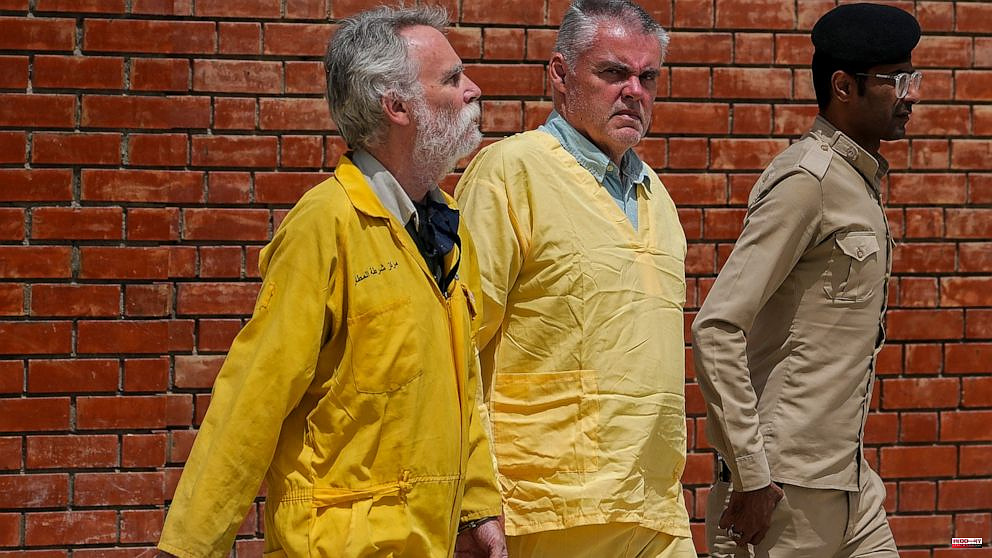BAGHDAD -- Monday's sentence by an Iraqi court for a British citizen to 15 years imprisonment was handed down after he was convicted of trying to smuggle artifacts from Iraq. This case has been attracting international attention.
Retired geologist Jim Fitton was convicted. This shocked Baghdad's court, as well as his defense attorney. His family and he argued that Fitton (66) had no criminal intent.
Thair Soud Fitton's lawyer, who was visibly shocked, stated that "I thought the worst scenario would be one-year, with suspension."
Soud stated that Fitton would appeal against the verdict.
Fitton found that a German national was innocent of any criminal intent and will be released.
Judge Jabir Abd Jabir concluded that Fitton intended to smuggle artifacts he had gotten and intend to take them out of the country.
This trial attracted international attention as Iraq attempts to expand its tourism industry. On May 15, the two men appeared in court wearing yellow detainees uniforms. They claimed that they did not intend to commit criminal acts and that they were unaware of any local laws.
Fitton stated that he believed the items he had collected were ancient fragments. However, he didn't know much about Iraqi laws at the time or that it was illegal to take the shards. Fitton stated that he collected such fragments as a hobby as a geologist and did not intend to sell them.
Soud argued that Fitton was in custody for several weeks before he hired him as his lawyer. This proves that Briton did not know the gravity of the case and the value of the goods in his possession.
However, the judge did not take into account Soud's arguments, which outlined Fitton’s ignorance of Iraqi laws as well as the value of the items that he had picked up. After security found the items in Fitton's luggage, Baghdad airport authorities arrested him and Volker Waldman. They were part of an expedition to explore the ancient sites of Iraq.
The tour guide was also a British citizen, and was in his 80s. He died in police custody, unrelated to his detention. This possession contained over 20 fragments of archaeology.
Fitton's family became concerned when he failed to arrive on the scheduled flight back from Kuala Lumpur on March 20, where he lives with his wife. Fitton was a highly-trained geologist who worked for oil and gas companies. His family learned later that Fitton had been detained in an airport holding cell.
Fitton was unable to attend his daughter's Malaysian wedding, which occurred in May. Leila stated that she was "heartbroken” by Fitton's absence at the time.
On social media, her hope for her father's return has been almost a daily fixture. Nineteen hours after Fitton was sentenced, she posted a picture of her parents to celebrate their 19th wedding anniversary. Another photo she posted was of her parents on a family hike. She wrote that she hoped her dad would be able join them on their next adventure.
His family was frustrated by the perceived inaction of the British Foreign Office in Fitton’s case and started a petition which has received over 100,000 signatures. The British diplomatic mission to Baghdad has not provided any comment on the case, and the British consul, who was present at the court session Monday, did not make any comments.
Fitton had 12 pieces of pottery and other shards in his possession. They were all collected by Fitton's family as souvenirs during a group tour to Eridu (an ancient Mesopotamian site located in the Dhi Qar Province). This site is believed to be one of the oldest sites associated with that civilization.
However, there is still controversy about Fitton's purchase of the items. The Iraqi Culture Ministry reported that they were more than 200 years old and did not provide any additional information about their origins. Any item less than 1,500 year old is considered antiquity. This refers to the period between the dawn of Western civilization and approximately 450 A.D.
The trial also caused divisions in the Iraqi public mind. Some believe the punishment is just because Iraq has been an invading country for foreigners and invaders with impunity for a long time. Others claimed that Iraq did not have proper site management to inform tourists about the laws.
Ali Makhzomy (founder of BilWeekend), stated that Eridu is a UNESCO World Heritage Site in Iraq. He believes that a better management plan is needed. It is the responsibility of the Iraqi government to do this."
They were not displayed in court. Amir Abdul Razaq from the southern province Nassriyah said that he believes the items Fitton had in his possession date back to 1,800 B.C. After AP shared images of Fitton's family sharing the shards, Officials from the government could not be reached immediately for comment.
Waldman's defense team claimed that the German tourist was carrying two pieces of luggage for Fitton, but that he didn't pick them up at the site. Based on the country's antiquities laws both men were charged with smuggling and could have faced the death penalty. Officials had stated that this was a remote possibility.
It was not clear whether Fitton could serve his sentence in his homeland. 2017 saw the signing of a prisoner swap deal between Iraq and the U.K.












